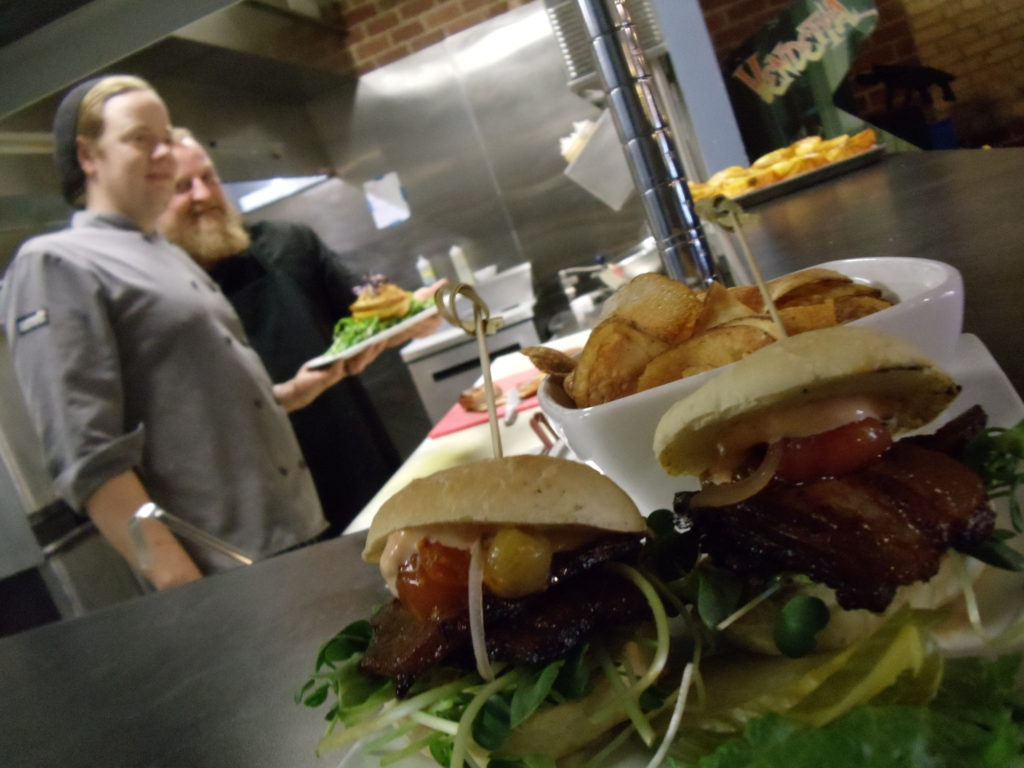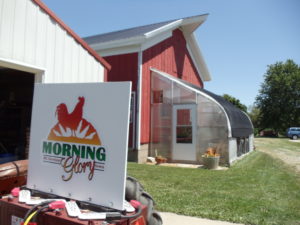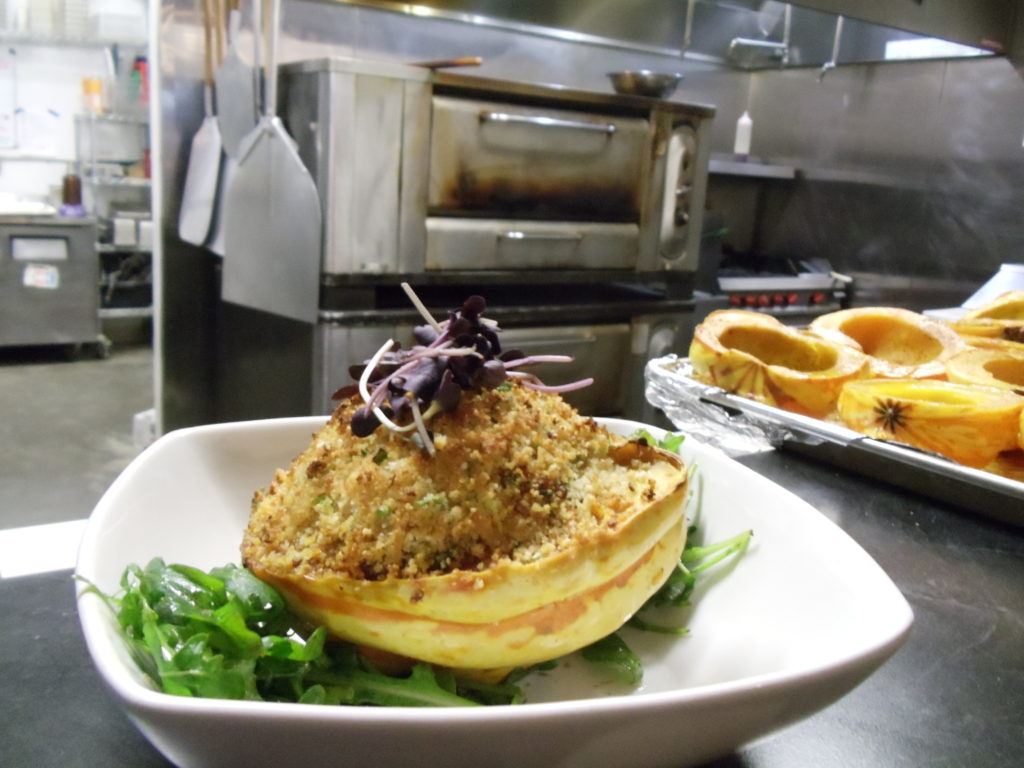
Smoked pork belly sliders are made with local ingredients at the Quarter Barrel Arcade & Brewery in Cedar Rapids, Iowa. (photo/Cindy Hadish)
By Cindy Hadish/for Lure magazine
Take one bite into a smoked pork belly slider at the Quarter Barrel Arcade & Brewery and it’s obvious this isn’t your typical “bar food.”
Quarter Barrel, 616 Second Ave. SE, Cedar Rapids, is among the Corridor restaurants making a conscious effort to locally source their ingredients, to provide higher quality menu options and support local producers.
“These chefs are all fun to work with and value knowing the farmer,” said Lois Pavelka of Pavelka’s Point Meats in rural Mount Vernon, which provides pork and beef to Quarter Barrel, as well as meat to places such as Salt Fork Kitchen in Solon, Kalona Brewery in Kalona and El Banditos and Orchard Green in Iowa City.
For Ms. Pavelka, farmers markets make up a larger share of income, but restaurants round out the farm’s financial picture, with 30 to 40 percent of sales in a given year.
The same is true of Donna Warhover of Morning Glory farm near Mount Vernon, who uses a Community Supported Agriculture (CSA) model as the farm’s primary source of income, along with farmers markets.

Morning Glory is a Community Supported Agriculture farm near Mount Vernon, Iowa. (photo/Cindy Hadish)
“The advantage of selling to local restaurants is that my CSA customers pay for their shares in the beginning of the season – what I need for purchasing seeds, equipment, etc.,” Ms. Warhover said. “The restaurants offer additional income throughout the season.”
Those restaurants also can help by using large quantities of a given food when those become available.
For example, a bumper crop of green beans, hand-picked by Ms. Warhover and her small crew on the 3-acre farm, didn’t go to waste when the chef at Cornell College in Mount Vernon was able to use bushels of the beans.
Cornell also bought hundreds of pounds of onions, cases of peppers and cabbage and large quantities of kale and herbs.
Other restaurants that have purchased produce from Morning Glory include Nodo in Iowa City, Rapid Creek Cidery at Wilson’s Orchard, and the Greyhound Deli and Mercy Medical Center, both in Cedar Rapids; some on a limited basis of particular products such as slender carrots, or basil in bulk for pesto.
Quarter Barrel in Cedar Rapids was another customer for Morning Glory, buying garlic scapes and arugula on occasion.
“When my wife and I decided to open the Quarter Barrel, the goal wasn’t to just be another restaurant,” co-owner Chris Ellis said. “We wanted it to be community-focused and I found a chef who shared those sentiments.”
Mr. Ellis is a vegetarian, and while Quarter Barrel’s menu includes vegetarian and vegan options such as the “Holy Shiitake!” specialty pizza, he said the only way he felt comfortable serving meat “is to know that the animals are raised as humanely as possible.”
“Sourcing locally and developing relationships with our farmers is the best way – the only way – to do this with any confidence,” he said.
Head Chef Andrew Hoffmann was the perfect fit for that vision.
Mr. Hoffmann, 29, and sous chef Josh Carter, 39, both spent their youths on Iowa farms, a background that influenced their perspective as chefs.
“That’s where our passion for food comes from,” Mr. Hoffmann said. “Buying this quality of food makes our job easier, because we’re working with amazing products.”
A whole slab of pork belly from Pavelka’s Point Meats is smoked in-house over spent grains from Quarter Barrel’s brewing process to create the mouth-watering pork belly slider, with local micro-greens added from Organic Greens in Kalona.
Tomatoes used at Quarter Barrel often come from gardens grown by Mr. Hoffmann in Mount Vernon and Mr. Carter in Cedar Rapids, as well as eggs that come from their backyard chickens.
“I love every aspect of food,” Mr. Carter said. “Cooking it, growing it and eating it.”
Mr. Hoffmann said sourcing local ingredients can be more time-consuming than ordering from one provider, but isn’t necessarily more expensive when a farmer has an abundance of a certain crop.
“It may not be what I planned on making,” he said, “but they can pick it and bring it to me the next day, so the nutrient level is higher and it’s not being shipped in from California, so the shelf life is longer.”
Mr. Hoffmann noted that sourcing locally also helps keep money in the local economy and supports start-ups, such as Jupiter Ridge in northeastern Iowa, which provides mushrooms and vegetables to Quarter Barrel. Squash from Jupiter Ridge was even being served in the depths of Iowa’s frigid winter.
“It is difficult, but not impossible,” Mr. Hoffmann said of finding local produce year-round, citing hoophouses, greenhouses and other means of extending the growing season. “Farmers have a lot of ingenuity and perseverance.”
Learn more about news in the Corridor at the Corridor Business Journal


No Comments Yet